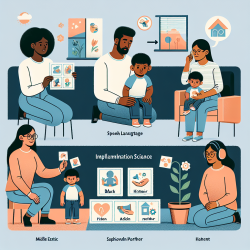Behavioral Parent Training (BPT) is an evidence-based intervention (EBI) designed to improve child behavior and caregiver-child interactions. Despite its proven effectiveness, BPT is underutilized, particularly among families with young Deaf or Hard of Hearing (DHH) children. A recent study, "Behavioral Parent Training for Families With Young Deaf or Hard of Hearing Children Followed in Hearing Health Care," highlights the potential benefits of BPT for this population and suggests ways practitioners can integrate these findings into their practice.
Understanding the Research
The study found that young DHH children who use hearing aids (HAs) and/or cochlear implants (CIs) experience disruptive behavior problems at rates similar to or higher than their hearing peers. These behaviors include noncompliance, aggression, and temper tantrums, which can significantly impact family dynamics and the child’s development.Key findings include:
- Higher rates of behavioral concerns among caregivers of DHH children compared to those of hearing children.
- Lack of access to mental health or behavioral services for DHH children.
- Potential benefits of integrating BPT into standard hearing health care.
Implementing Behavioral Parent Training
Practitioners can leverage the following strategies to incorporate BPT into their services for young DHH children:
1. Stakeholder Engagement
Engage caregivers, DHH adults, audiologists, speech-language pathologists, and other service providers in the development and implementation of BPT programs. This ensures that the intervention is culturally and linguistically appropriate and meets the specific needs of DHH children and their families.
2. Tailored Interventions
Adapt existing BPT programs to address common scenarios faced by caregivers of DHH children, such as resistance to wearing HAs or CIs and communication barriers. Tailoring the content to include these specific challenges can increase the relevance and effectiveness of the intervention.
3. Training and Support
Provide training for practitioners in delivering BPT to families with DHH children. This includes understanding the unique needs of this population and using strategies to enhance caregiver-child communication and behavior management.
4. Multidisciplinary Collaboration
Collaborate with professionals across disciplines, including mental health, audiology, and early intervention, to ensure a comprehensive approach to addressing the behavioral and developmental needs of DHH children.
Encouraging Further Research
While the current study provides valuable insights, further research is needed to rigorously test the effectiveness of BPT for DHH children in real-world settings. Practitioners are encouraged to participate in or support research efforts to expand the evidence base and refine intervention strategies.To read the original research paper, please follow this link:
Behavioral Parent Training for Families With Young Deaf or Hard of Hearing Children Followed in Hearing Health Care.










